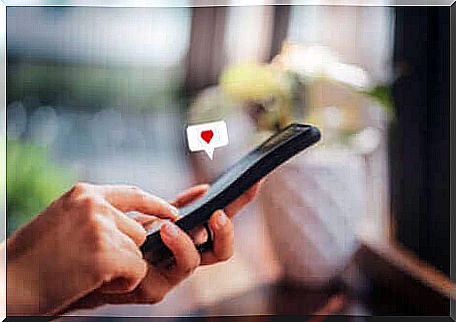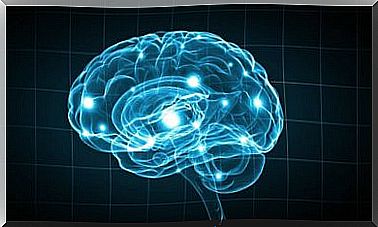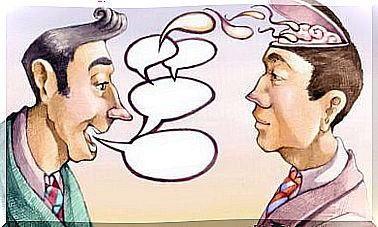Social Networks And Feelings: Pathological Distance

Social networks promote a pathological distance between what we feel and what we show to the world. This distance promotes anxiety.
Thanks to them, we have the possibility of obtaining reinforcements almost instantly. This is a quick, but effective dose of dopamine. Like all small pleasures, it must be repeated often to be satiating. And this is problematic.
Social networks make us equal when it comes to sharing content. In return, we are under implicit pressure to make them interesting. At the same time, our desire to please pushes us to hide our less friendly or boring side. So, on the one hand, we have an imaginary audience that we want to satisfy and, on the other hand, a reality to manufacture.
We should ask ourselves the following questions … How do social networks invite us to invent virtual reality? How can the difference in affective valence between what we feel and what we show affect us?

A real danger
Nowadays, we rely on social media platforms like Facebook, Twitter, Snapchat, YouTube, Instagram or even Tik Tok to be connected with each other. While each of these networks have their advantages, it’s important to remember that they can never replace human connections in the real world.
We need direct contact to trigger the hormones that relieve stress and make us feel happier, healthier, and more positive. Spending too much time interacting on social media can exacerbate mental health issues, such as anxiety and depression.
Social media can promote negative experiences such as:
- Feeling inadequate about your life or your appearance : Even if you know that the images you see on social media are being manipulated, they can make you feel insecure.
- Fear of Missing Out (FOMO ) : While FOMO has been around much longer, social media seems to exacerbate the feeling that other people live better than you. It can affect your self-esteem, cause anxiety and increase dependence on these networks.
- Isolation : A study from the University of Pennsylvania found that heavy use of Facebook, Snapchat and Instagram increases feelings of loneliness. Conversely, the study showed that reduced use can make us feel less alone and isolated, thus improving our overall sense of well-being.
- Depression and Anxiety : Nothing better than direct contact with someone we love to reduce stress and improve our mood.
- Cyberbullying : Around 10% of teens report being bullied on social media, and many more are the subject of offensive comments.
- Self-absorption : Sharing your life and intimate thoughts on social media can create unhealthy egocentricity and pull you away from real life connections.
Pathological distance linked to social networks can cause anxiety
Social media use can be problematic when it’s directly associated with a decrease in the quality or frequency of face-to-face interactions, distracting you from work, or making you sad or jealous. The same is true if you use them to make others jealous. If so, maybe it’s time to question yourself.
One of the most troubling factors isn’t how often we post content, but the honesty with which we share content. Posting content where we seem happy when we feel sad can increase anxiety.
An obligation to publish on social networks?
Most of us have a small, loyal following on social media. Probably less than 10% of the people who follow us are people with whom we have a more intimate relationship.
In addition, social networks do not allow us to make money if we are not “influencers”. We don’t owe them much.
At most, we will have the satisfaction of being able to share information and content on certain subjects. In many cases, the impact of our content on social media will depend more on the attitude of our friends or followers towards us than on the message itself or how it is presented.
In short, social networks are a window to “show” our best professional or personal face. However, they are rarely a source of long-term well-being.
In addition, we can sometimes feel the pressure of having to publish certain content, as if we have to feed an invisible being. This pressure can be very problematic when it creates anxiety.

Wedding day
Take the example of a person who is looking forward to their wedding day. She is also very happy to share photos from this day. But when the day comes, the setbacks multiply. It’s too hot, she argues with her partner at the party and she has terrible back pain.
No doubt, she feels happy inside her, but the day is not going as she wanted it to. She doesn’t feel like sharing photos on social media, but she thinks that if she doesn’t soon, people will find it weird and she will feel uncomfortable.
It then displays a snapshot of the day to “take shelter”. It sounds like a very hypothetical situation, but in reality it is happening in many different ways every day. We post an image that tries to project an emotional state that we don’t actually feel.
Is this the kind of life we want to lead? We can cause rejection and even mistrust if we show ourselves to be different on the networks. Even “influencers” cannot shake off the mistrust of those around them, even if it is “a way of making a living”.
Showing a difference between what we really feel and what we actually do can cause psychological discomfort and distrust of our surroundings. In addition, the development of a certain pathology in our affectivity, cognition and behavior can have long-term consequences.
It is not a question of giving up social networks, but their use should make us think about what they bring us. It is important to determine if, instead of giving us well-being, they are causing us anxiety and self-esteem issues.
If they’re here to stay, remember that learning is an ongoing process. You are free to stop showing what does not really represent you.










